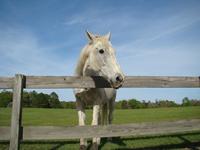Did you see this nice article by Donna White in the Wall Street Journal?
How would you feel about your parents donating everything to take care of the horses? If you can visit the farm it looks like a nice place to retire – for people or horses! If you can’t give it all away maybe you’d just like to help out the Horse Tales Literacy Program??
By Donna Gehrke-White — Sun Sentinel
Horses & Legacy
FORT LAUDERDALE, Fla. — You’ve made a few bucks, acquired a few things — but you can’t take it with you.
And as time goes on, more people have been choosing to invest in their passions upon their death instead of just an inheritance to others. For many, building a fortune gives them the freedom to give it away to support a cause.
Paul Gregory, a Fort Lauderdale real estate agent, already knows he won’t be getting an inheritance. His parents, Mary and Peter Gregory, who once owned a resort in Lauderdale-by-the-Sea, Fla., used their wealth to buy a farm just north of Gainesville, Fla., to care for more than 100 abused and neglected horses. When they die, their farm will remain a non-profit organization helping horses. Their son couldn’t be happier.
“What they do is amazing,” he said. Gregory and his two siblings “are all supportive of it. It’s something they have wanted to do all their lives. They are some of the hardest-working people I know. I wish I had more money I could give to them.”
Nationwide, leaving a legacy in a bequest was up nearly 19 percent in a year to almost $23 billion in 2010, according to the non-profit Charity Navigator.
Baby boomers have especially been interested in establishing a legacy. Three-fourths recently told pollsters that passing down family values and life lessons was more important than the monetary amount they’re leaving in an inheritance, according to a recent survey by Allianz Insurance.
“We grew up in a do-good generation — we were going to change the world,” said Christine “Christy” Lambertus, a Fort Lauderdale board-certified, estate-planning attorney who is planning to leave a legacy.
Childless people are especially giving, said Lisa Mendheim, a spokeswoman for Broward County Animal Care, which recently was left $5,000 in a will by an animal lover. The money was used to buy medicine and food for two animal shelters. Mendheim’s late aunt also left money to help animals.
“I thought it was a pretty cool thing to do,” Mendheim said. “She did not have any children. She had pets all her life. She always rescued pets.”
Many give to help animals, such as a recently deceased client of Boca Raton, Fla., financial planner Mari Adam. The woman bequeathed more than $1 million to help abandoned or abused cats and dogs in South Florida, Adam said.
Others have concentrated on helping their college alma maters, impoverished children, the arts or not-for-profit foundations.
More would like to give but are afraid they are going to run out of money with the wobbly stock market and low interest rates, Adam added.
It’s especially important for those with no close living relatives to make a will, specifying where they want their money to go, attorney Lambertus said.
Many who do give prefer to do so without fanfare.
“As a group of people, they are modest — they don’t want to be recognized from the rooftops,” said Allison Shipley, a partner in South Florida at PricewaterhouseCoopers who has had clients anonymously help migrant children become educated.
A few become known only after a charity releases information about a generous bequest.
Take Helen Stoykov of Pompano Beach, Fla.
She lived a quiet, frugal life, going to work at an early age after her father died. She worked as a machinist helping build the engines in B-26 bombers during World War II before going on to work for the federal government.
When Stoykov died at age 93, she left more than $1 million to set up an endowment fund at the Fort Lauderdale-based Community Foundation of Broward to support her passions — art, music and animals.
“I think that was her nature,” said Kathie Weiss, who helped Stoykov. “That’s how she was. She would always help out.”
Now living on their non-profit Mill Creek Farm, the Gregorys only became known after their Retirement Home for Horses emerged as an attraction with people able to tour its gently rolling hills and pet the aging horses on Saturdays. More than 250,000 have walked its grounds over the years, Peter Gregory, 83, said.
“We are going to die very poor, but we will die very happy,” said Gregory, who recently celebrated his 58th wedding anniversary with his wife. “We care about what happens to the horses.”

